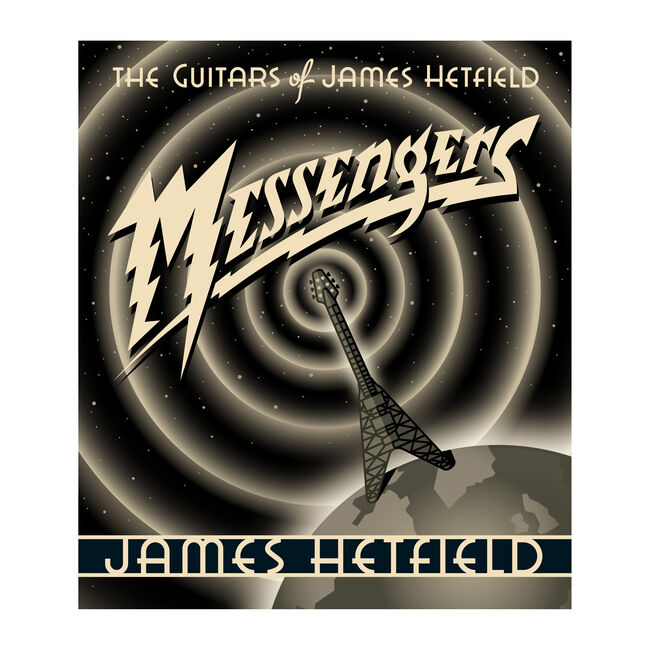James Hetfield says “if there was a guitar that changed the course of my history” it was this one – and it’s a cheap copy
The story of this particular guitar features in the Metallica man’s new book about his six-strings, Messengers: The Guitars Of James Hetfield

Metallica frontman James Hetfield has announced the publication of a new book documenting his gear history, arriving in October. Titled Messengers: The Guitars Of James Hetfield, it sees the metal icon share the stories behind his favorite instruments.
While we’ll have to wait until October 17 for the full publication, there are some interesting tales to be had in the preview pages, including the story of the electric guitar Hetfield refers to as the ‘OGV’ – his original Electra Flying Wedge.
“I thought it was a Gibson Flying V, just like the one Michael Schenker used,” confesses Hetfield, in the spread about the guitar. “That's all I cared about. It was white, it was a V-shape, it had a Gibson plate on it, and it was cheap.
“Now I know why, because it was made in Japan. For me, it didn't matter. Later on, I think when we were in New York the first time, somebody said, ‘Err, that's not a Gibson! It's got a bolt-on neck!’ I didn't know, and I didn't care.”
Prior to the V, Hetfield details the “crappy five-dollar swap-meet guitar” he first learned to play on, noting, “I painted it probably ten times – at one point it had Eddie Van Halen stripes on it!”
It was only when he and Lars Ulrich agreed to play together in an appearance on the Metal Massacre compilation that Hetfield went looking for a new axe. He was, as alluded to above, spellbound by UFO at the time – and, in particular, the look of the band’s guitarist Michael Schenker, replete with long blonde hair and a white Flying V. As such, the ‘OGV’ gave him that confidence boost.
“What I think about most is how happy I was when Lars came over [to see it], because it felt like the beginning of all the ‘coolness’ that we were trying to achieve,” recalls Hetfield.
Get The Pick Newsletter
All the latest guitar news, interviews, lessons, reviews, deals and more, direct to your inbox!
“It felt like we had arrived… [like] we were going to make it… I did not care that it was a copy of a Gibson. It played great, it sounded great, and it had the look that I wanted.”
Hetfield picked up the guitar in 1980 for around $200 and used it almost exclusively until its headstock was snapped in 1984.
It has become established as a legendary instrument among fans, too – famous for the etched ‘Fuck it’ Hetfield scratched into the paintwork. Indeed, in Messengers... the metal legend reflects on everything he owes to that particular instrument.
“I’m not being overly dramatic in saying that if there was a guitar that changed the course of my history, it was the OGV,” argues Hetfield. “It's one of the fastest guitars I have to this day, with very, very good mids. It's very clear but crunchy, too.”
It’s a nice antidote to the cork-sniffing, brand snobbery that we guitarists can sometimes fall prey to and, perhaps more importantly, a fine lesson in the merits of finding the right guitar at the right time.
“It gave me extra confidence," concludes Hetfield, simply. "Almost like a shield.”

Messengers: The Guitars Of James Hetfield will be published in Deluxe, Limited Edition and hardcover formats. The $750 Deluxe and $150 Limited Edition versions have already sold out, but pre-orders remain open for the hardcover format, which costs $80.
Hetfield is not the only Metallica member who’s got guitars on his mind at the moment. Yesterday Kirk Hammett and Gibson announced new Custom Shop and USA Standard versions of the legendary "Greeny" Les Paul, which Hammett now owns.
For more information about Messengers, and to pre-order your own copy, head to Metallica’s store.

Matt is Deputy Editor for GuitarWorld.com. Before that he spent 10 years as a freelance music journalist, interviewing artists for the likes of Total Guitar, Guitarist, Guitar World, MusicRadar, NME.com, DJ Mag and Electronic Sound. In 2020, he launched CreativeMoney.co.uk, which aims to share the ideas that make creative lifestyles more sustainable. He plays guitar, but should not be allowed near your delay pedals.
“It holds its own purely as a playable guitar. It’s really cool for the traveling musician – you can bring it on a flight and it fits beneath the seat”: Why Steve Stevens put his name to a foldable guitar
“Finely tuned instruments with effortless playability and one of the best vibratos there is”: PRS Standard 24 Satin and S2 Standard 24 Satin review











